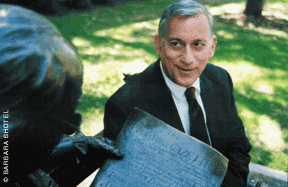
Walter Isaacson, former chair and CEO of the CNN News Group, spoke on campus last semester about his bestselling biography of Penn’s colorful founder, Ben Franklin: An American Life. The next day he sat down for an interview with Gazette freelancer Barbra Shotel CW’64.
What intrigued you about Benjamin Franklin?
He’s the Founding Father who is most made of flesh and blood. We can see ourselves and our values reflected in him, because he’s not intimidating the way George Washington is. He had his flaws. He was self-aware. He was funny. There are all sorts of stories and anecdotes that he tells about himself and that other people tell about him. But, deep inside, he was a man of great virtue, especially the virtue of tolerance and especially, religious tolerance.
When you mentioned Franklin’s flaws [in your talk at the Annenberg Center’s Zellerbach Theatre], you said he was not a romanticist in terms of his marriage. What other flaws do you see in Ben Franklin?
I think the relationship with his family was at times troubled. He had a great relationship with his wife but it was not deeply romantic—a solid partnership. And, he loved to travel and she didn’t. So, he was away a lot of the time in England or up and down the Colonies, including when she died. He had a struggle with his son, his illegitimate son, whom he adored. But they broke over the Revolution in 1775 when his son William remained loyal to the Crown and Franklin became a patriot for independence. But the other flaw that he wrestled with—and that we all must wrestle with when we deal with the Founders and when we deal with our country—was slavery. Franklin had owned two slaves for part of his life, but he spent his life fighting against tyranny and against the repression of individual rights. So, as he got older, he became dismayed about slavery and his own complicity. And, not only did he free his slaves, but he became active in schools for freed slaves in America. And, after the Constitutional Convention, when he was in his eighties, his last crusade was to be president of the Society for the Abolition of Slavery. It’s an ability to have flaws and to wrestle with them and try to correct them that makes Benjamin Franklin so useful in understanding history. He often talked about the errors he made and how he tried to rectify them. And like a good shopkeeper, he tried to keep books of what he did right and what he did wrong, and how he tried to correct the flaws and errors that he found in himself.
It sounds like you are referring to his report card on himself of his virtues.
Yes, he did his virtues score-card, and he was finally able to conquer the 12 that he had listed for himself like frugality and industry. And when a friend told him he had left off the virtue of humility, Franklin in his self-deprecating and funny way said it was right, and that he had to add it to his list.
After writing this book, what are your lasting impressions of two great accomplishments of Franklin—his founding of The Pennsylvania Gazette and his founding of Penn?
If you asked him what he was, he would say, a printer, a newspaperman, a publisher. And The Pennsylvania Gazette [the newspaper which serves as the namesake of this alumni magazine] was the foundation of his career. If you asked about his most important civic project, it might be the Academy, which became the University of Pennsylvania. He believed in a practical and useful education. It was in contrast to the religious-affiliated colleges like Harvard and Yale, and it was in contrast to Jefferson’s idea of skimming off a new elite. Franklin believed that education could help every aspiring person, whatever their class or status, and that education should be engaged in useful endeavors to improve society.
If Franklin walked in right now and sat down next to you, what would be the one subject you would want to talk to him about?
I would want to discuss with him America’s values and the role it should play in this world today. But, being an ingenious person, I am sure he would want to play with my BlackBerry, learn about the Internet, which he would have adored, and talk about the technological marvels of our time. He also had such a good sense of humor that I am sure he would be happy to joke about President Clinton’s scandals, and worry about President Bush’s fiscal responsibility, but also admire the fact that America is fighting for certain ideals in this world, and that our democracy has become even more democratic over the years. More and more people are being enfranchised. He was a great believer in opening up democracy rather than fearing democracy.




